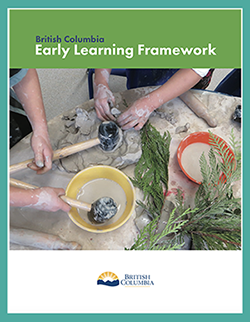Module 1: The Principles of Early Learning
Theory and Practice
Theory and practice are interconnected. Each influences the other.
Some of the theories that educators may draw upon include:
Socio-cultural theories say that children are active and inventive learners. Families, culture, historical, economic, and political factors influence how children learn.
Post-foundational theories challenge taken-for-granted systems of knowledge. They invite us to examine our assumptions about power, equity, and social justice.
Indigenous theories model caring for children in a variety of ways. These theories are based on unique worldviews, distinct languages, cultures, traditions, and practices.
Developmental theories view children as developing and learning in linear and universal stages over time.
The Early Learning Framework supports the vision of respectfully living and learning together. It invites educators to engage with theories and perspectives that are respectful of all cultures. When you pause, notice, and reflect on your work with young children, you may notice how developmental theories are embedded in your practice. You may begin to consider different theories and possibilities.
Stretching your thinking beyond known understandings is key to the Early Learning Framework. It is called critically reflective practice.
